With impeachment over, critics see Donald Trump ‘retribution tour’
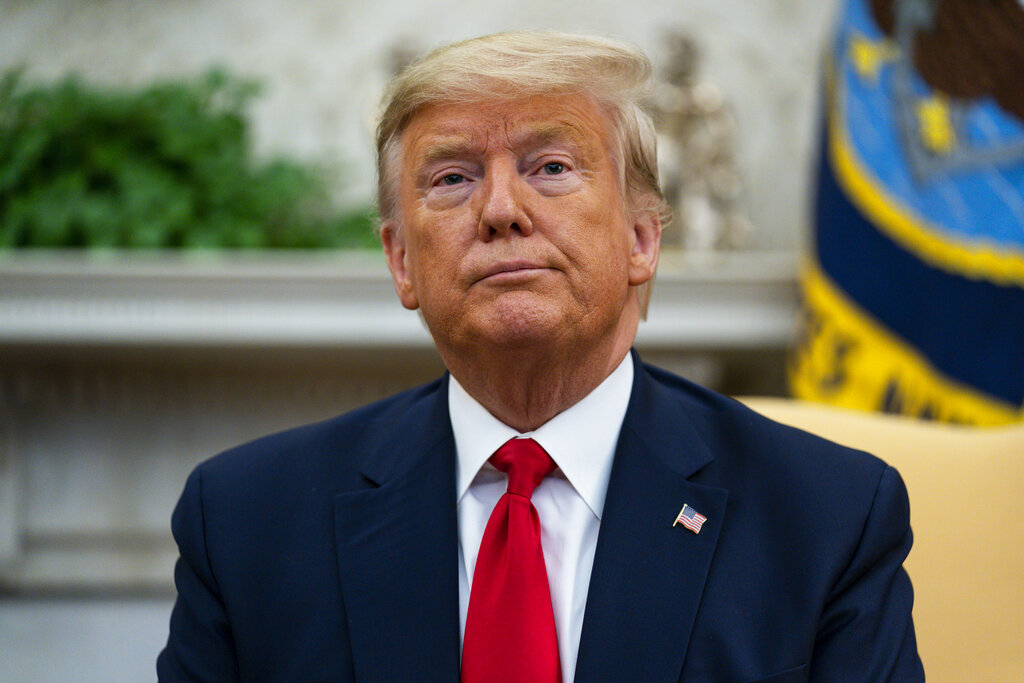
Trump has told confidants in recent days that he felt both vindicated and strengthened by his acquittal in the Senate.
Aide who testified against Donald Trump escorted out of White House
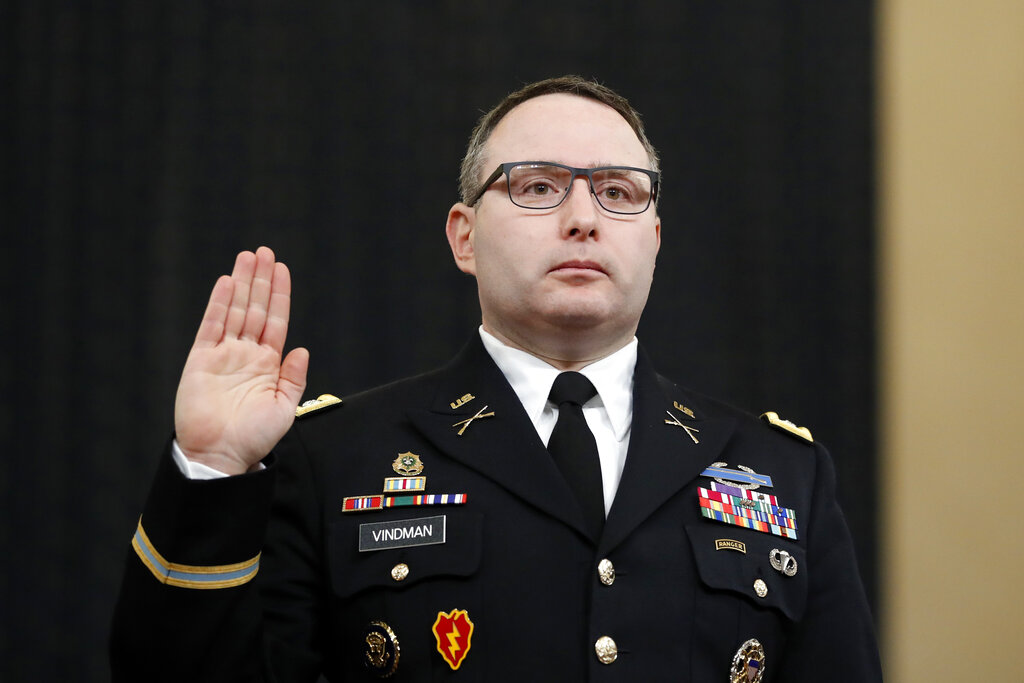
Vindman’s status had been uncertain since he testified in a congressional hearing.
What to watch during the Donald Trump impeachment hearings
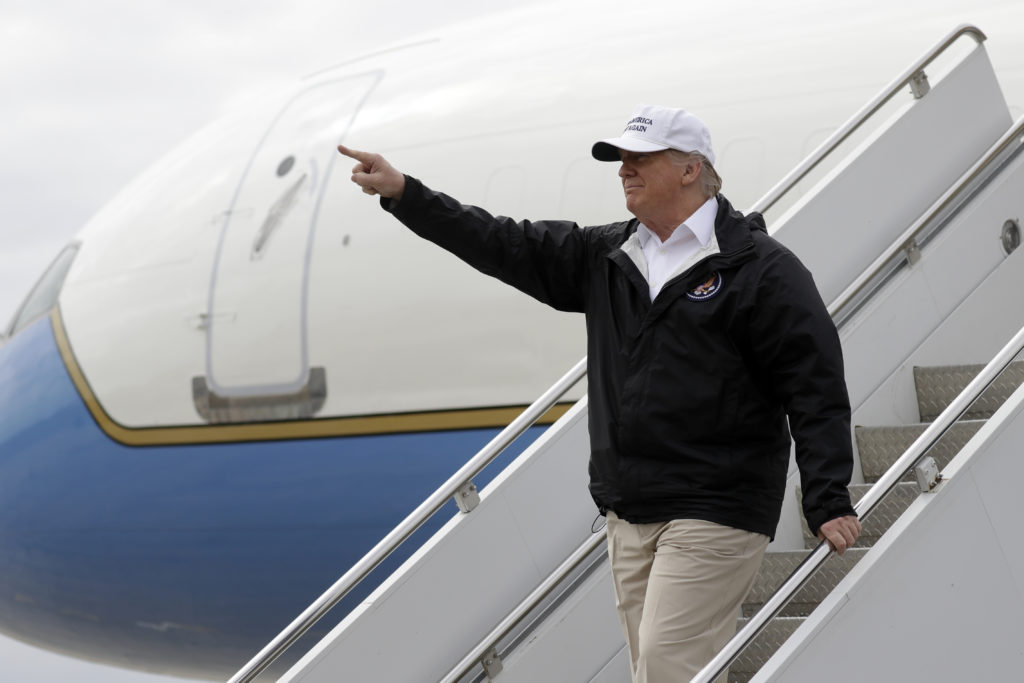
Exactly what is Gordon Sondland’s story? Certainly it’s full of international mystery, which House impeachment investigators are sorting through as they probe President Donald Trump’s pressure on Ukraine to investigate Joe Biden. But the intrigue is largely due to other witnesses recalling conversations with Sondland that he did not mention to impeachment investigators. Trump’s ambassador to the European Union, an Oregon hotelier and million-dollar Trump donor, Sondland has said he cannot recall many of the episodes involving him that others have recounted in colorful detail. What he does recall he sometimes remembers differently. The discrepancies with other witnesses, and Sondland’s with himself, matter as he testifies Wednesday under oath and penalty of perjury. What to watch when the hearings open at 9 a.m. EST: AT ISSUE Listen for how Sondland describes his role in Trump’s Ukraine policy and whether that policy was to hold up military aid until Ukraine made a public announcement that it was investigating Biden’s son Hunter Biden. Former White House national security aide Fiona Hill testified in private that Sondland informed her that he was in charge of Ukraine policy because the Republican president said so. Asked about that conversation during a deposition, Sondland said: “I don’t recall. I may have; I may not have. Again, I don’t recall.” Besides, he says now that he viewed his role on Ukraine as one of support rather than leadership. JULY 10 MEETINGS Testimony from multiple witnesses have described a pair of pivotal, sometimes tense, meetings at the White House on July 10 involving combinations of U.S. and Ukrainian leaders. Several of those present say Sondland explicitly connected a coveted White House visit to a public announcement by Ukraine of corruption investigations. Army Lt. Col. Alexander Vindman remembers Sondland saying that day that the Ukrainians would have to deliver an investigation into the Bidens. Sondland tells a different version, saying he doesn’t recall mentioning Ukraine investigations or Burisma, the gas company on whose board Hunter Biden served. The only conflict he describes from that day is a disagreement on whether to promptly schedule a call between Trump and Ukrainian President Volodymyr Zelenskiy. Sondland was in favor. EVERYTHING’ William Taylor, the acting U.S. ambassador in Ukraine, told lawmakers that Sondland said that “everything” Ukraine wanted — a White House visit for its new leader and the release of military aid — was contingent on a public announcement of investigations into the 2016 election and into Burisma. Sondland tells a more complex story. In his closed-door testimony, Sondland stated that he wouldn’t have withheld military aid for any reason. Not only that, he said he didn’t recall any conversations with the White House about withholding military assistance in return for Ukraine helping with Trump’s political campaign. Even then, though, he left himself some wiggle room, saying a text message he sent to Taylor reassuring him that there was no quid pro was simply what he had heard from Trump. Weeks later, after testimony from Taylor and National Security Council official Tim Morrison placed him at the center of key discussions, Sondland revised his account in an extraordinary way, saying “I now recall” more details. He amended his testimony to confirm that Taylor’s account was correct. Among the conversations Sondland now recalled was telling an aide to Zelenskiy in September that military aid likely would not occur until Ukraine made public announcements about corruption investigations. HOW INVOLVED WAS MULVANEY? Multiple witnesses describe a cozy relationship between Sondland and Mick Mulvaney, the White House acting chief of staff. Vindman, a National Security Council official, says Sondland cited a discussion with Mulvaney when pushing Ukrainian officials to open the investigations that Trump wanted into the 2016 presidential election and Biden. Fiona Hill, another White House national security official, says the then-national security adviser, John Bolton, told her he didn’t want to be part of “whatever drug deal Sondland and Mulvaney are cooking up.” Sondland suggests he knows Mulvaney only well enough to wave and say hello. TRUMP, REPUBLICANS? Of the nine witnesses testifying over three days this week, White House officials are concerned most about Sondland — because they aren’t sure what he’s going to say. If Sondland’s name-dropping is accurate, he may have had direct conversations with Trump. It’ll be hard for the president to attack his own EU ambassador, or for Republicans aware of the president’s expectation of loyalty, to do so. HOW SONDLAND IS SEEN OVERSEAS He calls himself a “disruptive diplomat.” Sondland may not be missed on the Continent as he testifies in Washington. Even before he got involved in Ukraine, Sondland’s caustic style had already created problems in Brussels, where he is the U.S. ambassador to the 28-nation EU. He visited Ukraine twice, even though it is not part of the EU and not part of his formal responsibilities. He also gave an interview with Ukrainian television boasting of his closeness to Trump and laying out his views of Ukraine, almost like instructions: “They’re Western and they’re going to stay Western.” Sondland is known for the grand gesture. At a party for diplomats and journalists last month at the ornate Cercle Gaulois club between the Belgian parliament and royal palace, he highlighted his close links with Trump and the president’s confidants. He spoke of a three-hour “family dinner” in Manhattan with two incoming EU leaders, Trump’s daughter Ivanka and her husband, Jared Kushner. There was also a special guest: comedian Jay Leno, who is said to be among Zelenskiy’s heroes. By Laurie Kellman Associated Press Follow Kellman on Twitter at https://www.twitter.com/APLaurieKellman Republished with the permission of the Associated Press.
White House officials to kick off big Donald Trump impeachment week
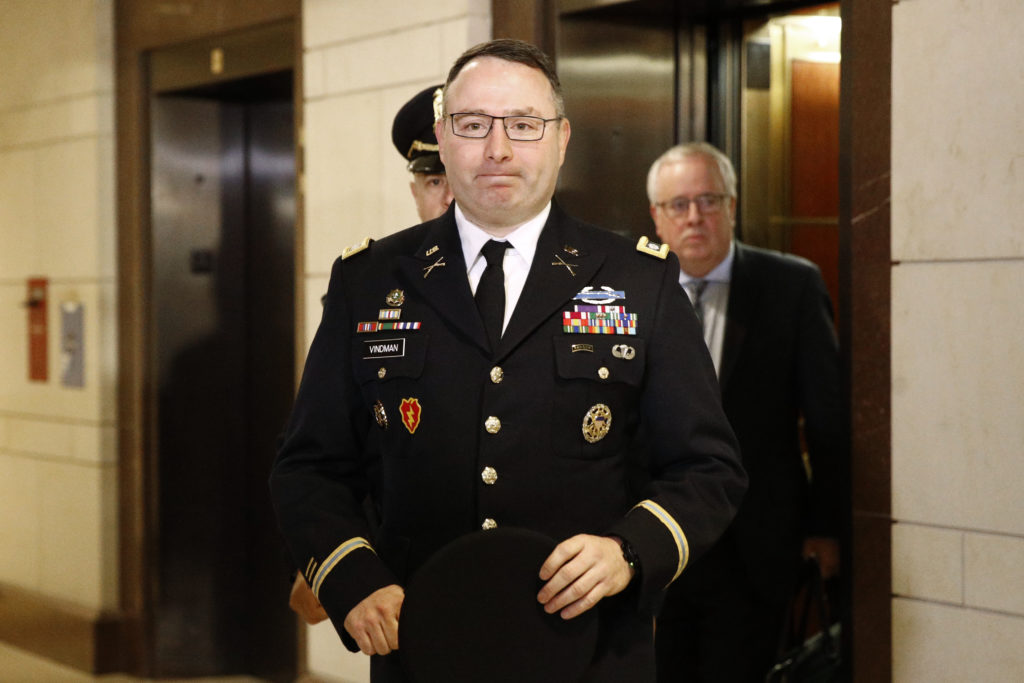
Two top national security aides who listened to President Donald Trump’s July call with Ukraine’s president are preparing to testify Tuesday at House impeachment hearings as the inquiry reaches deeper into the White House. Lt. Col. Alexander Vindman, an Army officer at the National Security Council, and Jennifer Williams, his counterpart at Vice President Mike Pence’s office, say they had concerns as Trump spoke on July 25 with the newly elected Ukraine president about political investigations into Joe Biden. After they appear Tuesday morning, the House will hear in the afternoon from former NSC official Timothy Morrison and Kurt Volker, the former Ukraine special envoy. In all, nine current and former U.S. officials are testifying as the House’s impeachment inquiry accelerates. Democrats say Trump’s pressure on Ukraine to investigate his Democratic rivals as he withheld U.S. military aid Ukraine needed to resist Russian aggression may be grounds for removing the 45th president. Trump says he did no such thing and the Democrats just want him gone. Vindman and the other witnesses have testified in earlier, closed-door sessions. Their depositions have been publicly released, and they’ll face direction questions from lawmakers on Tuesday. “I did not think it was proper to demand that a foreign government investigate a U.S. citizen,” said Vindman, a decorated Iraq War veteran. He said there was “no doubt” what Trump wanted from Ukrainian President Volodymyr Zelenskiy. It wasn’t the first time Vindman, a 20-year military officer, was alarmed over the administration’s push to have Ukraine investigate Democrats, he testified. Earlier, during an unsettling July 10 meeting at the White House, Ambassador Gordon Sondland told visiting Ukraine officials that they would need to “deliver” before next steps, which was a meeting Zelenskiy wanted with Trump, the officer testified. “He was talking about the 2016 elections and an investigation into the Bidens and Burisma,” Vindman testified, referring to the gas company in Ukraine where Hunter Biden served on the board. “The Ukrainians would have to deliver an investigation into the Bidens,” he said. “There was no ambiguity.” On both occasions, Vindman said, he took his concerns about the shifting Ukraine policy to the lead counsel at the NSC, John Eisenberg. Williams, a longtime State Department official who is detailed to Pence’s national security team, said she too had concerns during the phone call, which the aides monitored as is standard practice. When the White House produced a rough transcript later that day, she put it in the vice president’s briefing materials. “I just don’t know if he read it,” Williams testified in a closed-door House interview. Pence’s role throughout the impeachment inquiry has been unclear, and the vice president’s aide is sure to be questioned by lawmakers looking for answers. Trump has already attacked Williams, associating her with “Never Trumpers,” even though there is no indication the career State Department official has shown any partisanship. The president wants to see a robust defense by his GOP allies on Capitol Hill, but so far so far Republicans have offered a changing strategy as the fast-moving probe spills into public view. They’re expected to mount a more aggressive attack on the witnesses as they try to protect Trump. In particular, Republicans are expected to try to undercut Vindman, suggesting he reported his concerns outside his chain of command, which would have been Morrison, not the NSC lawyer. Under earlier questioning, Republicans wanted Vindman to disclose who else he may have spoken to about his concerns, as the GOP inch closer to publicly naming the still anonymous whistleblower whose report sparked the inquiry. GOP Sen. Ron Johnson, who was deeply involved in other White House meetings about Ukraine, offered a sneak preview of this strategy late Monday when he compared Vindman, a Purple Heart veteran, to the “bureaucrats” who “never accepted Trump as legitimate.” “They react by leaking to the press and participating in the ongoing effort to sabotage his policies and, if possible, remove him from office.” It is entirely possible that Vindman fits this profile, said Johnson, Republican-Wisconsin. The White House has instructed officials not to appear, and most have received congressional subpoenas to compel their testimony. The witnesses are testifying under penalty of perjury, and Sondland already has had to amend his earlier account amid contradicting testimony from other current and former U.S. officials. Sondland, the wealthy donor whose routine boasting about his proximity to Trump has brought the investigation to the president’s doorstep, is set to testify Wednesday. Others have testified that he was part of a shadow diplomatic effort with the president’s personal lawyer, Rudy Giuliani, outside of official channels that raised alarms. Morrison has referred to Burisma as a “bucket of issues” — the Bidens, Democrats, investigations — he had tried to “stay away” from. Sondland met with a Zelenskiy aide on the sidelines of a Sept. 1 gathering in Warsaw, and Morrison, who was watching the encounter from across the room, testified that the ambassador told him moments later he pushed the Ukrainian for the Burisma investigation as a way for Ukraine to gain access to the military funds. Volker provided investigators with a package of text messages with Sondland and another diplomat, William Taylor, the charge d’affaires in Ukraine, who grew alarmed at the linkage of the investigations to the aid. Taylor, who testified publicly last week, called that “crazy.” A wealthy hotelier who donated $1 million to Trump’s inauguration, Sondland is the only person interviewed to date who had direct conversations with the president about the Ukraine situation. Morrison said Sondland and Trump had spoken about five times between July 15 and Sept. 11 — the weeks that $391 million in U.S. assistance was withheld from Ukraine before it was released. Trump has said he barely knows Sondland. The committee will also hear on Wednesday from Laura Cooper, a deputy assistant secretary of defense, and David Hale, a State Department official. On Thursday, David Holmes, a State Department official in Kyiv, and Fiona Hill, a former top NSC staff member for Europe and Russia, will
Nancy Pelosi invites Donald Trump to testify as new witnesses prepare

House Speaker Nancy Pelosi invited President Donald Trump to testify in front of investigators in the House impeachment inquiry ahead of a week that will see several key witnesses appear publicly. Pushing back against accusations from the Republican president that the process has been stacked against him, Pelosi said Trump is welcome to appear or answer questions in writing, if he chooses. “If he has information that is exculpatory, that means ex, taking away, culpable, blame, then we look forward to seeing it,” she said in an interview that aired Sunday on CBS’ “Face the Nation.” Trump “could come right before the committee and talk, speak all the truth that he wants if he wants,” she said. Senate Democratic leader Chuck Schumer echoed that suggestion. “If Donald Trump doesn’t agree with what he’s hearing, doesn’t like what he’s hearing, he shouldn’t tweet. He should come to the committee and testify under oath. And he should allow all those around him to come to the committee and testify under oath,” Schumer told reporters. He said the White House’s insistence on blocking witnesses from cooperating begs the question: “What is he hiding?” The comments come as the House Intelligence Committee prepares for a second week of public hearings as part of its inquiry, including with the man who is arguably the most important witness. Gordon Sondland, Trump’s ambassador to the European Union, is among the only people interviewed to date who had direct conversations with the president about the situation because the White House has blocked others from cooperating with what it dismisses as a sham investigation. And testimony suggests he was intimately involved in discussions that are at the heart of the investigation into whether Trump held up U.S. military aid to Ukraine to try to pressure the country’s president to announce an investigation into Democrats, including former Vice President Joe Biden, a leading 2020 candidate, and Biden’s son Hunter. Multiple witnesses overheard a phone call in which Trump and Sondland reportedly discussed efforts to push for the investigations. In private testimony to impeachment investigators made public Saturday, Tim Morrison, a former National Security Council aide and longtime Republican defense hawk, said Sondland told him he was discussing Ukraine matters directly with Trump. Morrison said Sondland and Trump had spoken approximately five times between July 15 and Sept. 11 — the weeks that $391 million in U.S. assistance was withheld from Ukraine before it was released. And he recounted that Sondland told a top Ukrainian official in a meeting that the vital U.S. military assistance might be freed up if the country’s top prosecutor “would go to the mike and announce that he was opening the Burisma investigation.” Burisma is the gas company that hired Hunter Biden. Morrison’s testimony contradicted much of what Sondland told congressional investigators during his own closed-door deposition, which the ambassador later amended. Trump has said he has no recollection of the overheard call and has suggested he barely knew Sondland, a wealthy donor to his 2016 campaign. But Democrats are hoping he sheds new light on the discussions. “I’m not going to try to prejudge his testimony,” Rep. Jim Himes, Democrat-Conneticut, said on “Fox News Sunday.” But he suggested, “it was not lost on Ambassador Sondland what happened to the president’s close associate Roger Stone for lying to Congress, to Michael Cohen for lying to Congress. My guess is that Ambassador Sondland is going to do his level best to tell the truth, because otherwise he may have a very unpleasant legal future in front of him.” The committee also will be interviewing a long list of others. On Tuesday, it’ll hear from Morrison along with Jennifer Williams, an aide to Vice President Mike Pence, Alexander Vindman, the director for European affairs at the National Security Council, and Kurt Volker, the former U.S. special envoy to Ukraine. On Wednesday the committee will hear from Sondland in addition to Laura Cooper, a deputy assistant secretary of defense, and David Hale, a State Department official. And on Thursday, Fiona Hill, a former top NSC staffer for Europe and Russia, will appear. Trump, meanwhile, continued to tweet and retweet a steady stream of commentary from supporters as he bashed “The Crazed, Do Nothing Democrats” for “turning Impeachment into a routine partisan weapon.” “That is very bad for our Country, and not what the Founders had in mind!!!!” he wrote. He also tweeted a doctored video exchange between Rep. Adam Schiff, the Democratic chairman of the Intelligence Committee, and Republican Rep. Jim Jordan, in which Schiff said he did not know the identity of the whistleblower whose complaint triggered the inquiry. The clip has been altered to show Schiff wearing a referee’s uniform and loudly blowing a whistle. In her CBS interview, Pelosi vowed to protect the whistleblower, whom Trump has said should be forced to come forward despite longstanding whistleblower protections. “I will make sure he does not intimidate the whistleblower,” Pelosi said. Trump has been under fire for his treatment of one of the witnesses, the former ambassador to Ukraine, Marie Yovanovitch, whom Trump criticized by tweet as she was testifying last week. That attack prompted accusations of witness intimidation from Democrats and even some criticism from Republicans, who have been largely united in their defense of Trump “I think, along with most people, I find the president’s tweet generally unfortunate,” said Ohio Republican Rep. Mike Turner on CNN’s “State of the Union.” Still, he insisted that tweets were “certainly not impeachable and it’s certainly not criminal. And it’s certainly not witness intimidation,” even if Yovanovitch said she felt intimidated by the attacks. Rep. Chris Stewart, Republican-Utah, said Trump “communicates in ways that sometimes I wouldn’t,” but dismissed the significance of the attacks. “If your basis for impeachment is going to include a tweet, that shows how weak the evidence for that impeachment is,” he said on ABC’s “This Week.” And the backlash didn’t stop Trump from lashing out at yet another witness, this time Pence aide Williams. He directed her in a Sunday tweet
Democrats prep for open hearings, seek John Bolton testimony
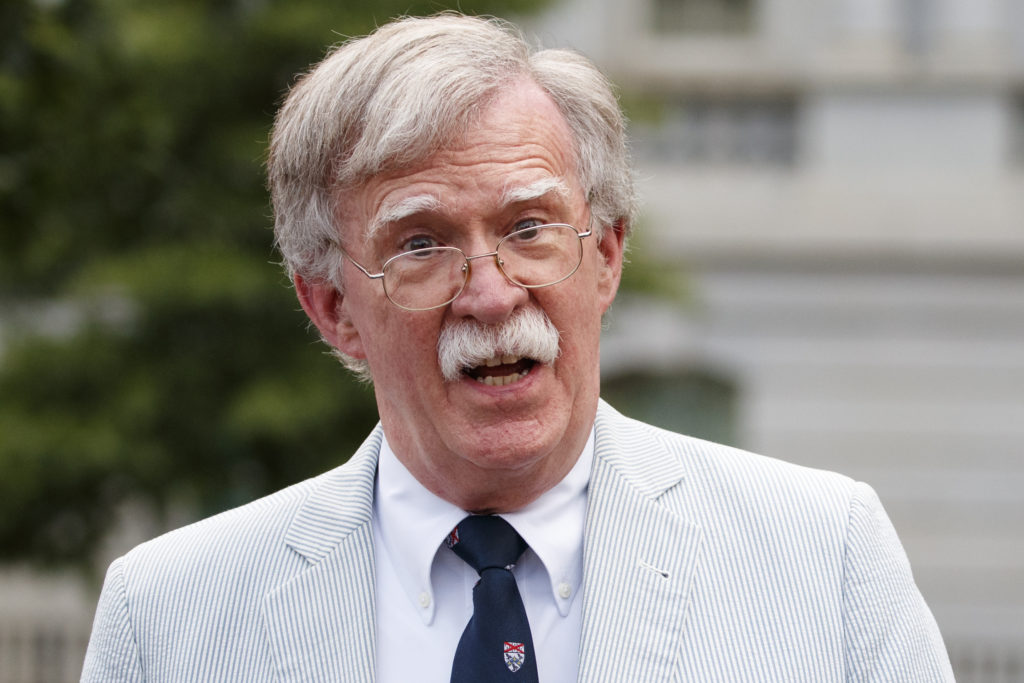
For only the fourth time in U.S. history, the House of Representatives has started a presidential impeachment inquiry. House committees are trying to determine whether President Donald Trump violated his oath of office by asking Ukraine to investigate political rival Joe Biden and his family, and to investigate the country’s involvement in the 2016 U.S. presidential election. A quick summary of the latest news and what’s to come: MOVING INTO PUBLIC VIEW The chairman of the House Intelligence Committee, Rep. Adam Schiff, told The Associated Press on Friday that the three committees leading the impeachment investigation plan to begin releasing transcripts of closed-door interviews as soon as early this week. The committees have interviewed current and former officials from the State Department and White House who have expressed concerns about Trump’s efforts to urge Ukraine to investigate Biden and his family. California Rep. Jackie Speier, a Democratic member of the Intelligence Committee, told CBS’ “Face the Nation” on Sunday that she expects one more week of closed-door interviews before committees move into open hearings. It’s so far unclear who will be asked to testify or how many hearings will be held. Leaders of the investigation say the hearings will be crucial to explain their inquiry to the American people. Schiff, Democrat-California said he hopes the testimony will eventually show “what the president did, why his misconduct is so serious” and how the “machinery of government” was pressed to help Trump influence the 2020 election. THE WHISTLEBLOWER A lawyer for the whistleblower who raised alarms about Trump’s dealings with Ukraine says his client has offered to answer written questions submitted by House Republicans.The surprise offer was made to Rep. Devin Nunes, the top Republican on the House Intelligence Committee. It would allow Republicans to ask questions of the whistleblower, who spurred the Democratic-led impeachment inquiry, without having to go through Schiff.Attorney Mark Zaid tweeted Sunday that the whistleblower would answer questions directly from Republican members “in writing, under oath & penalty of perjury,” part of a bid to stem escalating efforts by Trump and his GOP allies to unmask the person’s identity. Only queries seeking the person’s identity won’t be answered, he said. Nunes hasn’t commented on the proposal. Rep. Jim Jordan, an Ohio Republican and member of the House Judiciary Committee who has been highly critical of the impeachment process, said in a statement that written answers wouldn’t be sufficient to probe and cross-examine the whistleblower. The whistleblower raised concerns about Trump’s July 25 call with Ukrainian President Volodymyr Zelenskiy, in which he pressed Zelenskiy to investigate Trump’s political rivals. MORE BEHIND CLOSED DOORS As they prepare to go public, impeachment investigators are continuing to schedule private depositions. Democrats have called in 11 witnesses this week, including Energy Secretary Rick Perry and former national security adviser John Bolton. It’s unclear whether any of them will come to Capitol Hill. Perry is the first member of Trump’s Cabinet asked to appear before the House. His testimony is scheduled for Wednesday, according to an official working on the impeachment inquiry who spoke wasn’t authorized to publicly discuss the planning and spoke on condition of anonymity. Energy Department spokeswoman Shaylyn Hynes indicated Friday that Perry would not appear for the closed-door hearing but would consider testifying in a public session.On Bolton, Schiff said he “has very important information about the president’s misconduct that the American people should hear.” Other witnesses in the inquiry have described Bolton’s concerns as Trump urged the Ukrainian investigations. The committees have invited Bolton to appear Thursday but not issued a subpoena for his testimony. Trump says he’s not going to insist that Bolton not testify. Bolton’s lawyer has said he will not appear without a subpoena. “It’s up to him and it’s up to the lawyers,” Trump told reporters. The committees also have scheduled and subpoenaed other witnesses from the White House and State Department. They include David Hale, an undersecretary at the State Department who has been mentioned in previous testimony. Key witnesses last week included Alexander Vindman and Tim Morrison of the National Security Council. Morrison, who stepped down the day before his testimony, confirmed that military aid to Ukraine was held up by Trump’s demands for the investigations. But Morrison testified that there was nothing illegal, in his view, about the quid pro quo at the center of the impeachment inquiry. Vindman testified that he had raised concerns about Trump’s pleas. COURT BATTLES Democrats are also fighting impeachment battles in court, though they have indicated that they don’t want to delay the investigation as those cases proceed. One witness called by Democrats, former National Security Council deputy Charles Kupperman, has asked a judge to decide whether he must appear before Congress. Trump has said his administration will not cooperate, and Kupperman has said he is caught between the two. Kupperman’s lawyer, Charles Cooper, is also Bolton’s lawyer. He said Bolton could be added to the case. Republished with the permission of the Associated Press.
Army officer says he raised concerns about Donald Trump and Ukraine
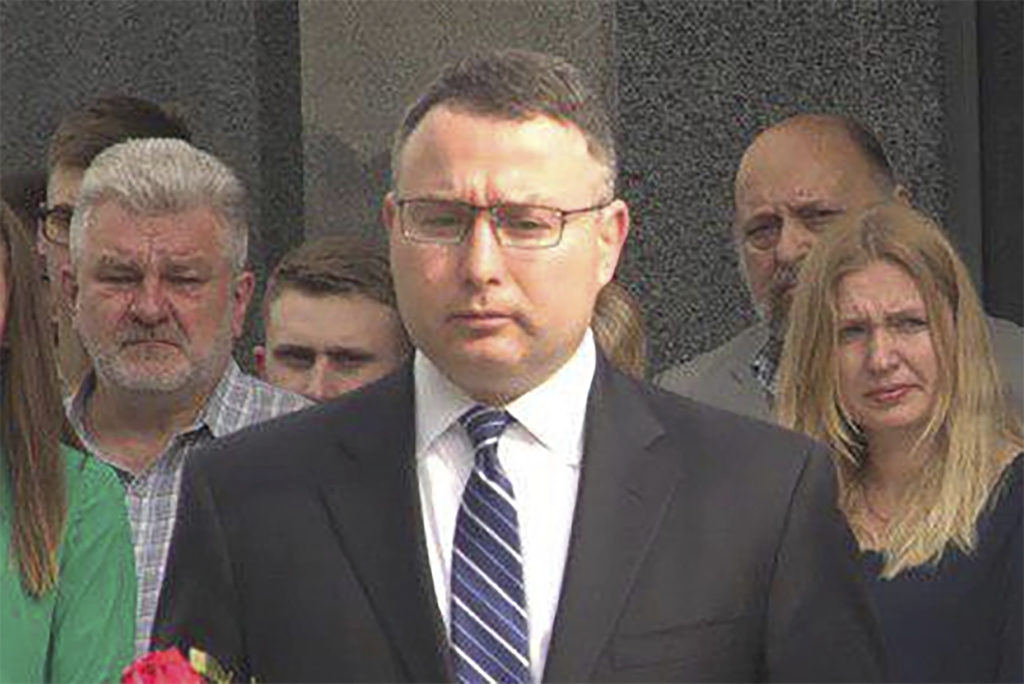
A military officer at the National Security Council twice raised concerns over the Trump administration’s push to have Ukraine investigate Democrats and Joe Biden, according to testimony the official is to deliver Tuesday in the House impeachment inquiry. Alexander Vindman, an Army lieutenant colonel who served in Iraq and, later, as a diplomat, is prepared to tell House investigators that he listened to President Donald Trump’s July 25 call with new Ukraine President Volodymyr Zelenskiy and reported his concerns to the NSC’s lead counsel. “I was concerned by the call,” Vindman will say, according to prepared testimony obtained Monday night by The Associated Press. “I did not think it was proper to demand that a foreign government investigate a U.S. citizen, and I was worried about the implications for the U.S. government’s support of Ukraine.” Vindman is the first official who listened in on that call to testify as the impeachment inquiry reaches deeper into the Trump administration and Democrats prepare for the next, public phase of the probe. He’s also the first current White House official to appear before the impeachment panels. The inquiry is looking into Trump’s call, in which he asked Zelenskiy for a “favor” — to investigate Democrats — that Democrats say was a quid pro quo that could be an impeachable offense. Trump took to Twitter Tuesday to denounce the probe as a “sham,” adding: “Why are people that I never even heard of testifying about the call. Just READ THE CALL TRANSCRIPT AND THE IMPEACHMENT HOAX IS OVER!” Vindman, a 20-year military officer and decorated veteran, testify that he first reported his concerns after an earlier meeting July 10 in which U.S. Ambassador to the European Union Gordon Sondland stressed the importance of having Ukraine investigate the 2016 election as well as Burisma, a company linked to the family of Biden, a 2020 Democratic presidential candidate. Vindman says he told Sondland that “his statements were inappropriate, that the request to investigate Biden and his son had nothing to do with national security, and that such investigations were not something the NSC was going to get involved in or push.” That account differs from Sondland’s, a wealthy businessman who donated $1 million to Trump inauguration and testified before the impeachment investigators that no one from the NSC “ever expressed any concerns.” He also testified that he did not realize any connection between Biden and Burisma. For the call between Trump and Zelenskiy, Vindman said he listened in the Situation Room with colleagues from the NSC and Vice President Mike Pence’s office and was concerned. He said he again reported his concerns to the NSC’s lead counsel. He wrote, “I realized that if Ukraine pursued an investigation into the Bidens and Burisma, it would likely be interpreted as a partisan play which would undoubtedly result in Ukraine losing the bipartisan support it has thus far maintained. This would all undermine U.S. national security.” Vindman, who arrived in the United States as a 3-year-old from the former Soviet Union, served in various military and diplomatic posts before joining the NSC. He was the director for European affairs and a Ukraine expert under Fiona Hill, a former official who testified earlier in the impeachment probe. Hill worked for former national security adviser John Bolton. At least one Trump ally sought to discredit Vindman ahead of his testimony by appearing to question his loyalty to the U.S. Former GOP Rep. Sean Duffy told CNN that the Purple Heart recipient has an “affinity” for Ukraine. “It seems very clear that he is incredibly concerned about Ukrainian defense,” he said. “I don’t know that he’s concerned about American policy, but his main mission was to make sure that the Ukraine got those weapons.” Vindman will be a key witness. He attended Zelenskiy’s inauguration with a delegation led by Energy Secretary Rick Perry, and he and Hill were both part of a Ukraine briefing with Sondland that others have testified irritated Bolton at the White House. Vindman will testify that he is not the whistleblower, the still unnamed government official who filed the initial complaint over Trump’s conversation with the Ukraine president that sparked the House impeachment inquiry. He will say he does not know who the whistleblower is. “I am a patriot, and it is my sacred duty and honor to advance and defend OUR country, irrespective of party or politics,” wrote Vindman, who was wounded in Iraq and awarded a Purple Heart. “For over twenty years as an active duty United States military officer and diplomat, I have served this country in a nonpartisan manner, and have done so with the utmost respect and professionalism for both Republican and Democratic administrations,” he wrote. The testimony comes a day after Speaker Nancy Pelosi announced the House will vote on a resolution to affirm the impeachment investigation, set rules for public hearings and outline the potential process for writing articles of impeachment against Trump. The vote is expected Thursday. It would be the first formal House vote on the impeachment inquiry and aims to nullify complaints from Trump and his allies that the process is illegitimate, unfair and lacking due process. Democrats insisted they weren’t yielding to Republican pressure. Pelosi dismissed the Republican argument that impeachment can’t begin without formal approval from the House and brushed off their complaints about the closed-door process. “I do not care. I do not care. This is a false thing with them,” Pelosi said. “Understand, it has nothing to do with them. It has to do with how we proceed.” Pelosi’s announcement Monday came just hours after a former White House national security official defied a House subpoena for closed-door testimony, escalating the standoff between Congress and the White House over who will testify. Charles Kupperman, who was a deputy to Bolton, failed to show up for the scheduled closed-door deposition after filing a lawsuit asking a federal court in Washington to rule on whether he was legally required to appear. By Lisa Mascaro, Mary

